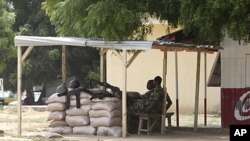In Nigeria, a presidential committee investigating violence in northern states is questioning the effectiveness of using soldiers to stop a series of bombings by Islamist terrorists.
Those terrorists claim responsibility for last month's bombing of the Abuja U.N. headquarters that killed 23 people.
President Goodluck Jonathan's principal approach to putting down a campaign of violence by Islamic fundamentalists has been sending in soldiers to take charge of security.
Joint military task forces currently control Plateau state and Borno state, where members of the Muslim group known as Boko Haram have shot numerous officials and bombed public gatherings. Soldiers have also increased patrols in the capital Abuja after a series of attacks, including the U.N. bombing.
But some northern politicians, including state governors, have complained about the use of troops, who they say are ignoring local intelligence reports.
A committee established to look into the violence says there is a “genuine failure of effective and coordinated intelligence gathering” in the campaign against Boko Haram.
Committee chair Usman Galtimari says Nigerian troops appear poorly equipped to combat terrorism.
"On the part of the security forces, there are considerable operational lapses and underfunded, underequipped [troops] and lack of collaboration. In addition, governments have failed to deliver justice and bring immediate relief to victims of the crisis," he said.
University of Abuja Sociology professor Abubakar Umar Kari says confusion among Nigerian security forces makes it easier for Boko Haram to attract new members.
"It is very easy to recruit, very easy because the Nigerian security apparatus is so porous. It is so easy to operate, almost with impunity," he said.
In the northeast city of Maiduguri, a group called the Committee of Borno Elders and Leaders of Thought wants troops there to leave because it says soldiers are escalating the crisis by abusing civilians.
The military command in Maiduguri says civilian leaders accusing soldiers of looting and rape are “sponsors, sympathizers and members” of Boko Haram.
Retired Lieutenant General Jeremiah Useni heads an influential group of religious and political leaders in northern Nigeria, known as the Arewa Consultative Forum. He says civilians are focusing on the conduct of individual soldiers and not on the force as a whole.
"When you get soldiers involved in security operations such as this, some troops may over-react. In such cases, they are normally fished out and tried. If one bad one out of 100 does something bad, then that is the one that people emphasize on. That is the problem," he said.
Useni says soldiers are doing their best at a job for which they are not properly trained.
"Soldiers are trained for war," he said. "What is happening now in Nigeria is that the soldiers use most of their time in doing police jobs because the situation now is more or is above the police capacity and that is why soldiers are brought in. Suppose we go to war with any country now. What do we do?"
Releasing its findings this week, the presidential committee said political “private militias” and the killing of Boko Haram leader Mohammed Yusuf have contributed to insecurity. Committee chair Galtimari says Nigerians expect justice for Yusuf's death while in police custody in 2009.
"The committee is of the view that the ongoing trial of police officers linked to the murder of Mohammed Yusuf - the sect leader - and some of his followers should be expedited and publicized to convey to the public the government's sincerity on the issue," he said.
The committee recommends opening talks with Boko Haram but only after it renounces all forms of violence and surrenders its arms. Boko Haram has refused previous negotiation offers because of what is says is the military buildup in northern states.




